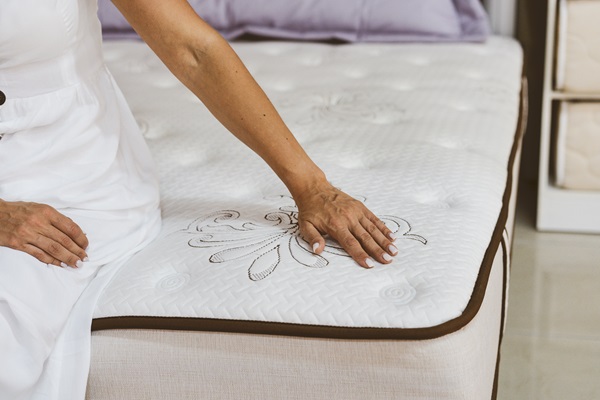A comfortable and supportive mattress is foundational to a good night’s sleep, impacting not only restfulness but also overall health. Over time, however, even the best mattresses degrade and lose their ability to provide the support and comfort you need. Recognizing when it’s time to replace your mattress is crucial, yet it’s often overlooked. This post will guide you through the various signs indicating you need a new mattress. From visible wear and tear to changes in your sleep quality, you’ll learn about the key indicators to help you make an informed decision about your sleep surface.
Contents
- 1 The Lifespan of Mattresses Explained
- 2 Physical Signs of Wear and Tear
- 3 Changes in Sleep Quality and Comfort
- 4 Allergies and Health Considerations
- 5 The Impact of Noise and Motion Transfer
- 6 New Developments in Mattress Technology
- 7 Assessing Your Personal Sleep Needs
- 8 Sleep Tight With The Right Mattress
The Lifespan of Mattresses Explained

The lifespan of a mattress varies depending on its type and quality. Innerspring mattresses typically last about 5-7 years, while memory foam and latex options can provide comfort for up to 10 years. The difference in longevity is due to the materials’ durability and how they respond to weight and pressure over time. It’s important to understand these averages, as they offer a baseline for when to start assessing your mattress for replacement.
Several factors influence how long a mattress remains functional. Regular use and body weight directly impact its lifespan. Moreover, how well you maintain your mattress, such as rotating it regularly or using a mattress protector, can significantly extend its life. Additionally, the initial quality of the mattress plays a crucial role. Higher quality materials tend to withstand wear and tear better over the years, making an initial investment in a good mattress a wise decision for long-term comfort and health.
Physical Signs of Wear and Tear

The most obvious signs that you need a new mattress are visible wear and tear. Sagging, especially in the areas where you sleep the most, indicates that the mattress is losing its ability to support your body adequately. This sagging can lead to discomfort and back pain, as your body is not being supported correctly during sleep. Similarly, lumps in the mattress suggest uneven wear and degradation of the internal structure, which can significantly disrupt sleep comfort.
Beyond the surface, other signs include tears in the fabric, poking springs, or a noticeable creaking noise when you move. These issues not only affect the comfort but also the safety of your mattress. When the internal components of a mattress are exposed or damaged, it can lead to further deterioration and even pose a risk of injury. Moreover, these physical changes are often indicative of deeper structural problems within the mattress, suggesting that it is beyond simple repair and needs replacement.
Changes in Sleep Quality and Comfort

A decline in sleep quality can be a subtle yet clear indicator that your mattress needs replacing. If you find yourself struggling to fall asleep, waking up frequently during the night, or feeling unrested in the morning, your mattress could be the culprit. These symptoms often result from a lack of proper support and comfort, which a worn-out mattress can no longer provide. Over time, this can lead to chronic sleep deprivation, affecting your mood, productivity, and overall health.
Moreover, if you notice an increase in body aches, particularly in the back, neck, or shoulders, upon waking, this is a significant sign that your mattress is no longer offering the support your body needs. A good mattress should distribute your body weight evenly and maintain spinal alignment. As mattresses age, they lose their ability to do so, leading to discomfort and pain. This shift in sleep quality and physical well-being is a strong indication that it’s time to start looking for a new mattress.
Allergies and Health Considerations

Old mattresses can become a breeding ground for allergens like dust mites, mold, and mildew, especially if they are not regularly cleaned or maintained. These allergens can trigger symptoms such as sneezing, coughing, and itchy eyes, particularly in individuals who are sensitive or have allergies. If you notice an increase in allergic reactions or respiratory issues while in bed or upon waking, it may be time to consider replacing your mattress.
In addition to allergens, an old mattress can exacerbate health issues like back pain and joint discomfort. Over time, the diminishing support can lead to poor sleeping posture, which in turn contributes to chronic pain conditions. Furthermore, the accumulation of sweat, oils, and dead skin cells in an old mattress can lead to skin irritations and even infections. The health implications of continuing to sleep on an old, worn-out mattress are significant, making it crucial to pay attention to these signs and prioritize mattress replacement for the sake of your health.
The Impact of Noise and Motion Transfer

As mattresses age, they often start making noises, which can disrupt sleep. Springs may begin to creak, and the overall structure can become noisy with every movement. This can be particularly bothersome if you’re a light sleeper or if the mattress is shared, as these sounds can disrupt not just your sleep but your partner’s as well. The increase in noise is a clear sign that the internal components of the mattress, like springs or foam, are wearing out.
Motion transfer is another factor that becomes more pronounced with an aging mattress. In newer mattresses, especially those designed with pocketed coils or memory foam, the impact of one person shifting or getting out of bed is minimized. However, as a mattress wears down, its ability to isolate motion diminishes. This can lead to disturbed sleep, especially for those who share a bed. If you find that your partner’s movements are increasingly waking you up, it’s a strong indication that your mattress is losing its effectiveness and may need to be replaced.
New Developments in Mattress Technology

Recent advancements in mattress technology have significantly improved sleep quality. Innovations like memory foam, cooling gels, and mattresses with adjustable firmness settings offer personalized comfort that wasn’t available in older models. These advancements address various sleep concerns, such as heat retention in memory foam or the one-size-fits-all approach of traditional innerspring mattresses. Understanding these new technologies can help you determine if your current mattress is outdated and lacking the benefits of modern designs.
These technological advancements also include improvements in support, durability, and health benefits. For instance, newer memory foam mattresses are designed to provide better spinal alignment and pressure relief, which can significantly enhance sleep quality. Additionally, many modern mattresses are constructed with hypoallergenic materials, catering to health-conscious consumers. If your current mattress lacks these advanced features, and you’re experiencing discomfort or poor sleep, it might be time to consider an upgrade to benefit from these technological improvements.
Assessing Your Personal Sleep Needs

It’s crucial to consider your personal sleep needs when evaluating whether you need a new mattress. Your sleep position, body weight, and personal preferences play a significant role in determining the right type of mattress for you. For instance, side sleepers generally require a softer mattress to alleviate pressure on the hips and shoulders, while stomach sleepers may need a firmer surface for proper alignment. If your current mattress doesn’t cater to your specific sleeping style, it may contribute to discomfort or pain.
Another sign that your mattress isn’t meeting your needs is if you consistently wake up with aches and pains, especially in your back, neck, or hips. This discomfort can indicate that your mattress isn’t providing the right level of support or pressure relief. Additionally, as you age or experience changes in your health, your mattress requirements may change. Paying attention to how your body reacts to your mattress and considering any recent changes in your health or sleeping habits can guide you in deciding if it’s time for a new mattress.
Sleep Tight With The Right Mattress
Recognizing the need for a new mattress is crucial for maintaining good sleep health and overall well-being. From visible wear and tear to changes in sleep quality and the presence of allergens, various signs indicate it’s time to replace your mattress. With the advancements in mattress technology, it’s easier than ever to find a mattress that suits your individual needs. Consider the impact your current mattress has on your sleep and health, and don’t hesitate to invest in a new one if these signs resonate with your experience. A good mattress is not just a bedroom accessory; it’s an investment in your health and well-being.


